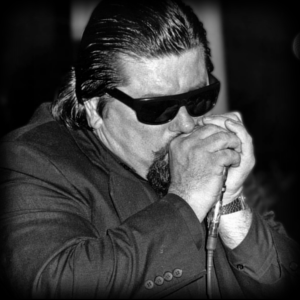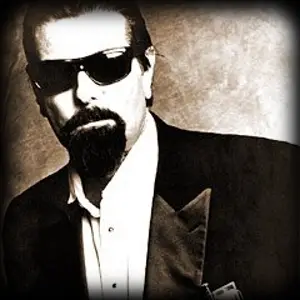WILLIAM CLARKE
 The sound of the harp has been central to the Blues since it’s origins in the Delta, and when harp players in Chicago amplified their instruments, the term ‘Mississippi Sax’ was born. William Clarke absorbed the Chicago sound and, following a skilled mentor, he took the harp to new places and his strong voice and talent for songwriting looked like giving him a great career. Sadly, he had just started making a name for himself on the world stage when ill-health struck.
The sound of the harp has been central to the Blues since it’s origins in the Delta, and when harp players in Chicago amplified their instruments, the term ‘Mississippi Sax’ was born. William Clarke absorbed the Chicago sound and, following a skilled mentor, he took the harp to new places and his strong voice and talent for songwriting looked like giving him a great career. Sadly, he had just started making a name for himself on the world stage when ill-health struck.
William Clarke was born in the Inglewood suburb of L.A. In 1951 and his first exposure to the Blues was through the Rolling Stones early albums. In his mid-teens, William played guitar and drums with friends, but when he took up harp in 1967, he found the instrument to express his Blues. Working in a machine shop in the daytime, William studied the style of ‘Shakey’ Horton, Little Walter, Rice ‘Sonny Boy II’ Miller and the other Chicago greats, and his reputation grew on the L.A. Club scene. He rubbed shoulders with T-Bone Walker, Big Mama Thornton, Lowell Fulson and PeeWee Crayton, and the man who was to become his mentor, George ‘Harmonica’ Smith. George was born by the Mississippi, made his bones in Chicago and was a fantastic Blues harp stylist. He mastered ‘chording’ and ‘octave’ techniques that extended the possibilities of the harp beyond blowing elegant lines and honking horn-like parts, which he also played with skill and agility.
This is why Bill was such a big deal in 1990
 With such a teacher, William made rapid progress, but George was also working with the young Rod Piazza and his band Bacon Fat, developing a devastating ‘twin-harp-attack’ routine. George and William would also use this trick when they started gigging together in 1977, and they played hundreds of shows until their partnership was broken in 1983 by George’s death at the age of 59. William had made three solo albums by that time, which were distributed by local labels, but his tribute album dedicated to George, ‘Tip From the Top’ got his name noticed when it was nominated for a Handy Award in 1987, and this convinced him to give up his day-job and get serious about The Blues. A live set released as ‘Rocking the Boat’ was widely acclaimed, despite not being nationally distributed, but when William signed for Alligator Records and recorded ‘Blow Like Hell’ in 1990, a major talent had arrived. A strong voice and a harp technique that had extended even his mentor’s work, marked William as a Blues star in the making.
With such a teacher, William made rapid progress, but George was also working with the young Rod Piazza and his band Bacon Fat, developing a devastating ‘twin-harp-attack’ routine. George and William would also use this trick when they started gigging together in 1977, and they played hundreds of shows until their partnership was broken in 1983 by George’s death at the age of 59. William had made three solo albums by that time, which were distributed by local labels, but his tribute album dedicated to George, ‘Tip From the Top’ got his name noticed when it was nominated for a Handy Award in 1987, and this convinced him to give up his day-job and get serious about The Blues. A live set released as ‘Rocking the Boat’ was widely acclaimed, despite not being nationally distributed, but when William signed for Alligator Records and recorded ‘Blow Like Hell’ in 1990, a major talent had arrived. A strong voice and a harp technique that had extended even his mentor’s work, marked William as a Blues star in the making.
Discography
There are now a dozen albums of William’s work including some good posthumous compilations, but he was in top form when he recorded this in 1990, his debut for Alligator. Great variation in these tracks; slow ballads with just piano and harp; up-tempo rockers; full band blow-outs and a Blues Music Award winning version of ‘Must Be Jelly’.